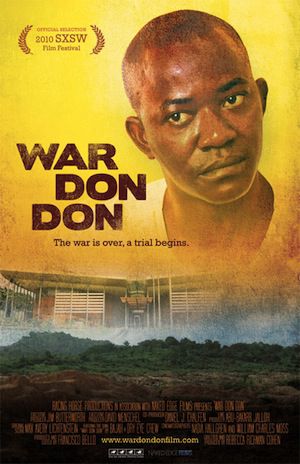STORY about Arts posted on November 18, 2010 by CalynShaw
The War is Over
Film review of War Don Don, showing Saturday at the Amnesty International Film Festival in Vancouver
In the centre of Freetown, the capital of Sierra Leone, sits a key cog of international justice. The Special Court for Sierra Leone was created to prosecute those deemed responsible for war crimes and crimes against humanity committed during the 11-year civil war.
“War Don Don” is a film about a country’s struggle for post-war reconciliation. The judicial process is supposed to bring justice and closure for the people of Sierra Leone, but the story is not simple and the lines of good and evil become blurred as we are taken through the trial of Issa Sesay.
Sesay, a commander in the Revolutionary United Front (RUF), was indicted by the special court for crimes against humanity and other war crimes, including terrorizing civilians, collective punishments, unlawful killings, crimes against humanity, sexual violence, physical violence, use of child soldiers, abductions and forced labor.
Director, Rebecca Richman Cohen, does not shy away from showing us the consequences of RUF actions. Interviews with survivors, many missing limbs because of the RUF’s affinity for amputation by machete, are included throughout the film, as are the comments from Sierra Leoneans seeking justice.
“The fact of the matter is he is an RUF. So I think he has to suffer the greatest penalty. I want him to be jailed for life,” said one emotional young man.
Sesay was convicted of 16 out of the 18 counts he faced and was sentenced to 52 years in prison. But there are times in the film that he is the most sympathetic character.
Chief Prosecutor, David Crane is adamant that Sesay is an evil war criminal. He begins his open statement: “This is a tale of horror, beyond the gothic and into the realm of Dante’s inferno. These dogs of war, these hounds from hell, unleashed by cynical external criminal actors.”
His hyperbolic rhetoric is objected to by the defence and is quickly cut off by the judge, but the tone of the prosecution team is clear, they are going after Sesay with everything they have.
Sesay’s defenders argue he was a reluctant fighter who protected civilians and played a crucial role in ending the conflict. Maybe the most compelling character in the film is Sesay’s attorney, Wayne Jordash. An unequivocal advocate for his client, it is also clear that he has a deep understanding of Sesay’s character. When he looks into the camera and says he has come to like and admire his client, it is impossible not to believe that there is more to this story than we first assume. A sympathetic war criminal is rare, and it is mostly through Jordash that we are able to see that there are flaws in the process.
“This institution is completely paranoid about anybody examining the darker corners of how it works,” he said. “I think any process that isn’t prepared to examine itself is fundamentally flawed.”
The access to Sesay, as well as other former RUF soldiers, gives us an opportunity to better understand that Sesay is not just a criminal but also a victim.
The incredible access to prosecutors, defense attorneys, victims, and Sesay makes the story compelling from a legal point of view, and it would have been easy for Cohen to get lost in the minutia of court proceedings. But ultimately the story returns to the victims. The people of Sierra Leone who were slaughtered and maimed by the RUF lie at the heart of this story.
Cohen refrained from using voiceover and instead relied on the individuals involved to tell the story. The internal debates and lingering questions facing the viewer are reflected by the Sierra Leoneans.
“You don’t fight evil with evil, you create more problems. So even if they’ve been wicked, if peace comes then the wickedness is done.”
“If the Court doesn’t send him to jail then the Court hasn’t done its work.”
The film is beautifully shot and the haunting war images will linger in your mind long after the credits. A must see during the Amnesty International Film Festival.
“War Don Don” is playing Saturday November 20 at 1:45pm at the Vancity Theatre.
The site for the Vancouver local of The Media Co-op has been archived and will no longer be updated. Please visit the main Media Co-op website to learn more about the organization.
